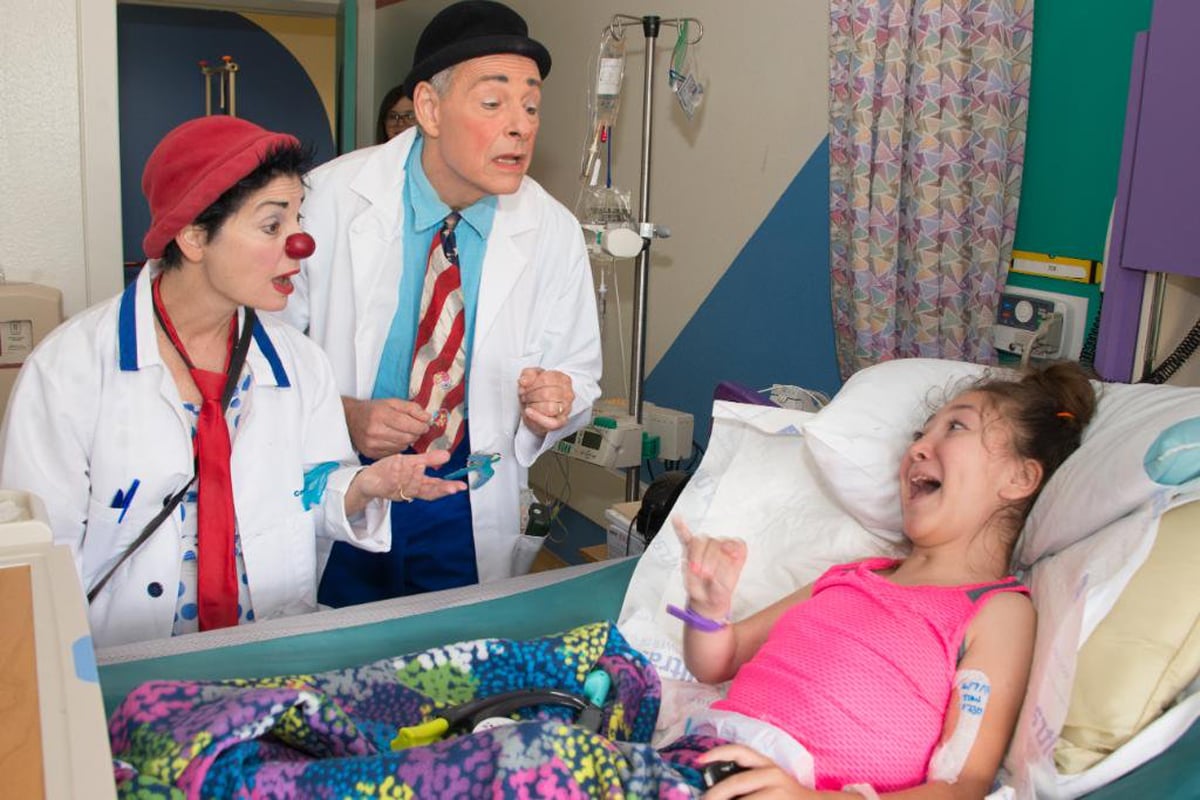According to pharmacists, laughter may not actually be the best medicine — yet a dose of good humor does go a long way to help children who are hospitalized and their families.
The Laughter League is a nonprofit organization using therapeutic health care clowning to help brighten the days of nearly 100,000 patients and families annually at pediatric hospitals and memory care centers nationwide. The organization, which recently merged with Humorology Atlanta, will bring its Cool Fool School training program to Atlanta for the first time, providing a workshop at the Alliance Theatre February 26 through March 1 to create a new generation of “hospital humorists.”
The work is crucial, said Laughter League co-founder Dick Monday in a recent Zoom interview.
“We allow kids to be kids again,” he said.
Monday is a seasoned performer and the former director of the Ringling Bros. and Barnum & Bailey Clown College. He and his partner, Tiffany Riley, have been working together for 20 years on the program, bringing joy to people in need.
The interview was conducted while Monday attended a reunion of 150 former Ringling clowns on a cruise ship. He joked that they were all staying in the same room on the boat.

“We would get unclaustrophobic if we did it any other way,” he said with a laugh.
Monday said hospital clowning requires a performer to be compassionate, observant and nimble, as you don’t know what a day visiting families in such circumstances will bring.
“During the course of a day, we will visit about 30 to 40 rooms and go to two or three waiting rooms,” he said. “As we go through the hall, everyone we see is important, including the staff. We’re there for them. Our job is to help alleviate stress.”
A team of two clowns works together while visiting rooms, observing situations where they might be able to intercede. Sometimes, even a patient who refuses to let them in is seen as a victory.
“We are the only people who come to a patient’s door where we knock and ask if we can come in, and they can say no,” he said. “That is empowerment. Sometimes that is exactly what they need. Within the first 24 hours of a stay in a children’s hospital, they will have that door knocked on approximately 74 times, and we are the only time that they can say no.”
Having two clowns in a room gives patients an opportunity to interact in a variety of ways.
“We are not there to perform for the child; we are there to engage,” he said. “We let them dictate exactly where they want to go. If they’re in the mood to go to a playful place, of course we’ll do that. If they’re not, we’ll be with them wherever they’re at, where they’re comfortable and can find a connection with us. That’s our superpower — trying to engage and connect with people who are going through some tough things.”
Monday said the work is life-affirming.

“We know that, physiologically, once the kid starts interacting with us, the healing process has a much better chance,” he said. “We’re trying our best to find the engagement so that we can bring some light and joy — maybe it’s just in a minute-long visit, maybe it’s 10 minutes. What we’re hoping is that, for the rest of that day, there’s a glow in the person’s room.”
Gina Rickicki, an Atlanta performer with Laughter League who has been a hospital clown for seven years, said she hopes that Cool Fool School will allow local performers the opportunity to discover a new way their talents can help people.
“There are so many artists that I have worked with in theater and improv or different kinds of art who would excel at hospital clowning or clowning in general,” she said. “Because it’s never been part of their lexicon, it doesn’t occur to them as an option.”
The workshop provides the opportunity to work with seasoned performers like Monday, Riley, Cirque du Soleil performer Michelle Matlock and others.
“If I can help create a space where another artist can discover what I’ve discovered for myself in this work, I would be thrilled,” Rickicki said. “This work, specifically in health care clowning, is the first time where my skills — my people skills, my comedy, my quick wit, my improv, my characters — all of the different bits of me were finally of service. Those skills finally had a place where they were directly and compassionately affecting a person’s life. And it’s one of the most beautiful things I’ve ever experienced.”
Since the pandemic, many Atlanta hospitals have abandoned auxiliary and outreach services such as visiting clowns or pets. Piedmont Columbus Regional Hospital still uses services like the Laughter League, and more patients and families could benefit from that kind of joy.
“When you can convince a tired adult to pop their own bubbles, you see a smile return to their face,” Rickicki said. “We’re all just kids in bigger bodies, and we need to honor that part of ourselves and recognize how much ‘playing’ is necessary to being a human.”
::
Benjamin Carr is an ArtsATL editor-at-large who has contributed to the publication since 2019 and a member of the American Theatre Critics Association, the Dramatists Guild, the Atlanta Press Club and the Horror Writers Association. His writing has been featured in podcasts for iHeartMedia, onstage as part of the Samuel French Off-Off Broadway Short Play Festival and online in The Guardian. His debut novel, Impacted, was published by The Story Plant.

